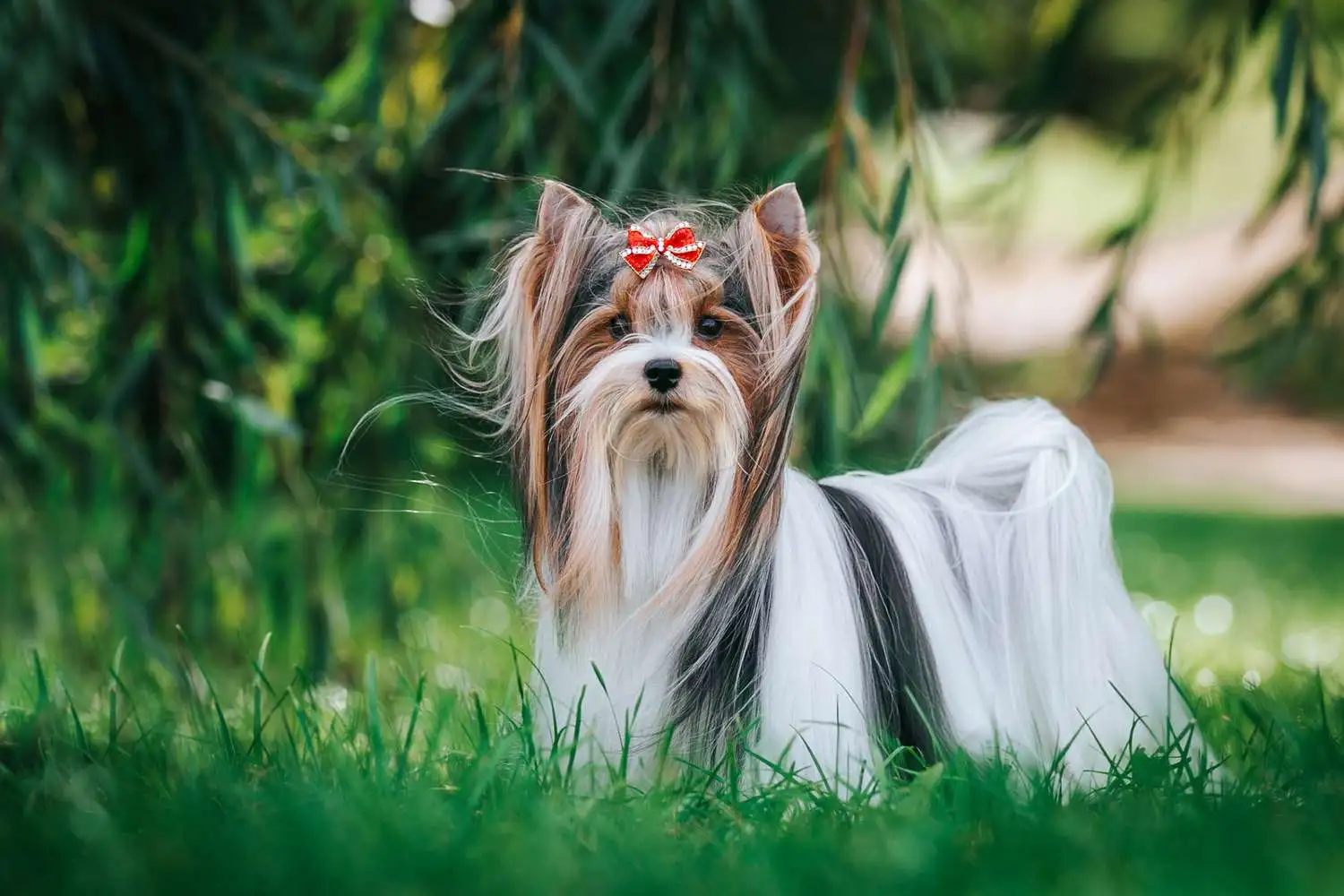In This Article
Biewer Terriers are a delightful and enchanting breed that has captured the hearts of dog enthusiasts worldwide. Known for their striking appearance and charming personalities, Biewer Terriers make excellent companions for various households. This comprehensive guide delves into everything you need to know about Biewer Terriers, from their history and characteristics to care, training, and adoption tips.
Biewer Terriers are a small, elegant breed known for their tri-color coats and vivacious demeanor. Originating from Germany, these dogs were initially bred from Yorkshire Terriers and are recognized for their distinct coloring and silky, flowing fur.
Choosing a Biewer Terrier means welcoming a playful, affectionate, and intelligent companion into your home. Their unique appearance and friendly nature make them a popular choice among families and individuals alike.
History and Origin
The Biewer Terrier’s story began in the 1980s in Bavaria, Germany, when a breeder named Hildegard and Werner Biewer developed the breed by selectively breeding Yorkshire Terriers. Their goal was to create a dog with a more diverse color palette and a charming temperament.
In 1987, the Biewer Terrier was officially recognized by the Fédération Cynologique Internationale (FCI), which established the breed standards that emphasize their unique tri-color coat and graceful build.
Physical Characteristics
Size and Build
Biewer Terriers are small dogs, typically standing between 9 to 11 inches tall and weighing between 5 to 10 pounds. They have a compact, well-proportioned body that exudes elegance and agility.
Coat and Color Variations
One of the most striking features of the Biewer Terrier is its beautiful tri-color coat, which includes white, gold, and jet black. Their silky fur requires regular grooming to maintain its luster and prevent tangles.
Distinctive Features
Biewer Terriers are known for their expressive eyes, perky ears, and bushy tails. Their overall appearance is both charming and distinctive, making them easily recognizable among other small breeds.
Temperament and Behavior
Personality Traits
Biewer Terriers are affectionate, playful, and highly intelligent. They are known for their lively personalities and strong bond with their owners, making them excellent family pets.
Suitability for Families and Other Pets
These terriers are generally good with children and can coexist peacefully with other pets when properly socialized. Their friendly nature makes them adaptable to various household dynamics.
Energy Levels and Activity Needs
Biewer Terriers have moderate energy levels and require regular exercise to stay healthy and happy. Daily walks, playtime, and mental stimulation are essential to prevent boredom and destructive behavior.
Health and Lifespan
Common Health Issues
Biewer Terriers are generally healthy, but like all breeds, they can be prone to certain genetic conditions such as patellar luxation, dental issues, and heart problems. Regular veterinary check-ups are crucial for early detection and management.
Lifespan Expectations
With proper care, Biewer Terriers typically live between 12 to 15 years. Their longevity can be influenced by factors such as diet, exercise, and regular health care.
Preventative Care and Regular Check-ups
Maintaining a Biewer Terrier’s health involves routine veterinary visits, vaccinations, and preventative treatments for parasites. Additionally, a balanced diet and regular exercise are essential for their well-being.
Grooming and Care
Coat Maintenance
Biewer Terriers require regular grooming to keep their silky coats in top condition. This includes daily brushing to prevent tangles and weekly trimming to maintain their elegant appearance.
Bathing and Cleaning
Bathing should be done every four to six weeks using a gentle dog shampoo to maintain coat health. Proper drying and brushing post-bath help prevent matting and keep their fur shiny.
Nail Trimming and Dental Care
Regular nail trimming and dental care are essential for Biewer Terriers. Overgrown nails can cause discomfort and dental issues can lead to more serious health problems if not addressed promptly.
Training and Socialization
Basic Training Techniques
Biewer Terriers are intelligent and eager to please, making training relatively straightforward. Positive reinforcement techniques, such as treats and praise, are highly effective with this breed.
Housebreaking and Crate Training
Consistency and patience are key when housebreaking a Biewer Terrier. Crate training can provide a safe space for your dog and aid in the training process by establishing a routine.
Socialization Strategies
Early and ongoing socialization is crucial for Biewer Terriers to develop into well-adjusted adults. Exposing them to various environments, people, and other animals helps build their confidence and reduce anxiety.
Diet and Nutrition
Recommended Diet for Biewer Terriers
A balanced diet tailored to the needs of small breeds is essential for Biewer Terriers. High-quality commercial dog food or a well-planned homemade diet can provide the necessary nutrients for their active lifestyles.
Supplements and Treats
Supplements such as omega-3 fatty acids can support coat health, while healthy treats can be used during training. It’s important to choose treats that are appropriate for their size and nutritional needs.
Foods to Avoid
Certain foods can be harmful to Biewer Terriers, including chocolate, grapes, onions, and certain artificial sweeteners like xylitol. Always consult with a veterinarian before introducing new foods to their diet.
Biewer Terrier in Comparison to Other Breeds
Biewer Terrier vs. Yorkshire Terrier
While both breeds share similar origins, Biewer Terriers are typically larger and have a more diverse color palette. Their temperaments are also slightly different, with Biewers being more laid-back.
Biewer Terrier vs. Maltese
Biewer Terriers and Maltese are both small, affectionate breeds, but Biewers tend to be more energetic and require more grooming. Maltese dogs are often more reserved and have a longer lifespan.
Choosing the Right Breed for Your Lifestyle
When selecting a breed, consider factors such as activity level, grooming needs, and temperament. Biewer Terriers are ideal for those seeking a lively and affectionate companion, while other breeds may better suit different lifestyles.
Finding and Adopting a Biewer Terrier
Choosing a Reputable Breeder
Selecting a reputable breeder ensures you receive a healthy and well-socialized puppy. Look for breeders who prioritize health testing, adhere to breed standards, and provide a nurturing environment for their dogs.
Adoption Options
Adopting a Biewer Terrier from a rescue organization or shelter is a compassionate choice. Many Biewers are in need of loving homes, and adoption can be a fulfilling way to add a new member to your family.
Cost of Owning a Biewer Terrier
The initial cost of a Biewer Terrier puppy can range from $1,500 to $3,000, depending on the breeder and lineage. Ongoing costs include food, grooming, veterinary care, and other essentials.
Frequently Asked Questions (FAQs)
Are Biewer Terriers hypoallergenic?
Yes, Biewer Terriers are considered hypoallergenic as they shed minimally, making them suitable for people with allergies.
Do Biewer Terriers shed?
Biewer Terriers shed very little, thanks to their silky, low-shedding coats. Regular grooming helps keep shedding to a minimum.
Conclusion
Biewer Terriers are charming, intelligent, and affectionate dogs that make excellent companions. Their unique appearance and friendly nature set them apart from other small breeds.
If you’re considering adding a Biewer Terrier to your family, take the time to research and connect with reputable breeders or rescue organizations. Embrace the joy and companionship that a Biewer Terrier can bring into your life.



